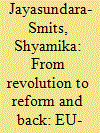| Srl | Item |
| 1 |
ID:
140338


|
|
|
|
|
| Summary/Abstract |
In December 2014, the European Union (EU) launched its civilian mission in Ukraine, EU Advisory Mission (EUAM). Although the mission's main purpose is to mentor and advice Ukrainian officials on civilian Security Sector Reform, this article argues that EUAM's deployment was driven by a broader geopolitical logic, that is, to soft balance Russia. Following Russia's annexation of Crimea in March 2014, international perceptions of Moscow's intentions turned increasingly ambivalent. Due to EU member states’ divergent interests vis-à-vis Russia and the union's lack of hard balancing capabilities, the only feasible means available to the EU to deal with the situation in Ukraine were diplomatic and economic pressure, that is, sanctions. However, whereas sanctions are designed to compel Russia to solve her ongoing conflict with Ukraine diplomatically, the EU is also undertaking soft balancing measures that allow it to undermine Russia's interests in Ukraine without confronting her directly. Two attributes make EUAM a soft balancing act: firstly, it improves the resilience of the Ukrainian state against Russian influence and pressure; and secondly, it shows political support to the Ukrainian government and people. There currently is a broad consensus among EU member states for supporting Ukraine in almost every way, short of military assistance. Whether or not this support is sustainable in the long run is an open question.
|
|
|
|
|
|
|
|
|
|
|
|
|
|
|
|
| 2 |
ID:
162500


|
|
|
|
|
| Summary/Abstract |
Security Sector Reform (SSR) is an important element of the EU’s external intervention toolkit. In an increasingly uncertain global security environment, the EU has currently stepped up its SSR endeavours. However, success of these efforts largely depends on the EU’s capabilities in navigating complex context-specific challenges. In particular the EU needs to be able to simultaneously address the functional and normative-societal imperatives that underpin SSR. This article considers the case of the EU’s ongoing SSR mission to Ukraine – the European Union Advisory Mission (EUAM). It asks, what are the unique context-specific challenges faced by EUAM in Ukraine? How do these challenges influence the EU’s ability to satisfy both the normative-societal imperative of SSR through the EUAM? This article mainly relies on secondary data, and applies a “Whole of Society” approach to conflict prevention and peacebuilding (WOS). Amidst a situation of ongoing multiple armed conflicts and EU-Russian relations of mutual dependence, a key finding is that the mandate of the mission has become more narrow and exclusive by sacrificing vertical coherence and the normative-societal imperative. We recommend EUAM adopt a more “revolutionary” approach to SSR, by adhering to key SSR normative principles so that the mission can overcome the challenges of the unique reform environment of Ukriane. This will also make it able to contribute more meaningfully to the wider reform process in an effective and sustainable manner.
|
|
|
|
|
|
|
|
|
|
|
|
|
|
|
|